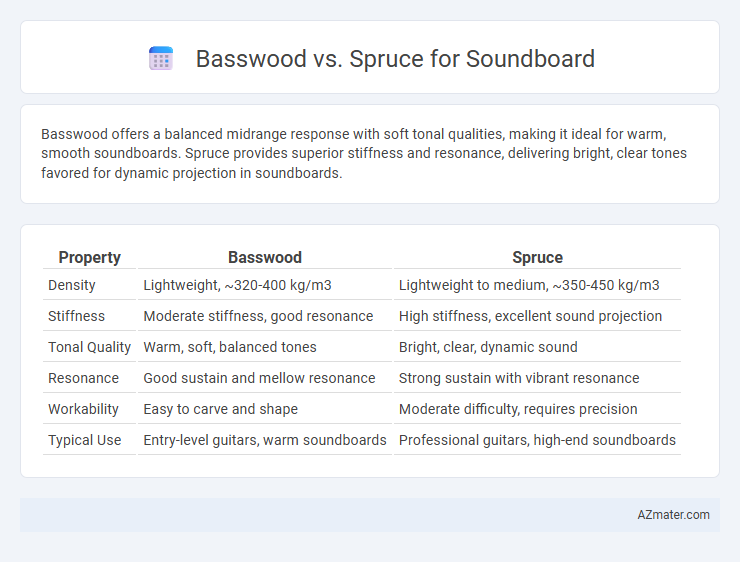Basswood offers a balanced midrange response with soft tonal qualities, making it ideal for warm, smooth soundboards. Spruce provides superior stiffness and resonance, delivering bright, clear tones favored for dynamic projection in soundboards.
Table of Comparison
| Property | Basswood | Spruce |
|---|---|---|
| Density | Lightweight, ~320-400 kg/m3 | Lightweight to medium, ~350-450 kg/m3 |
| Stiffness | Moderate stiffness, good resonance | High stiffness, excellent sound projection |
| Tonal Quality | Warm, soft, balanced tones | Bright, clear, dynamic sound |
| Resonance | Good sustain and mellow resonance | Strong sustain with vibrant resonance |
| Workability | Easy to carve and shape | Moderate difficulty, requires precision |
| Typical Use | Entry-level guitars, warm soundboards | Professional guitars, high-end soundboards |
Introduction to Soundboard Woods: Basswood vs Spruce
Spruce is the preferred soundboard wood in high-end acoustic guitars due to its excellent strength-to-weight ratio and superior resonance, providing clear, bright tones and strong projection. Basswood, while less common for soundboards, offers a softer, warmer sound with balanced midrange frequencies and is often used in electric guitar bodies rather than acoustic soundboards. The choice between basswood and spruce influences tonal quality, volume, and sustain, with spruce favored for dynamic response and basswood for smooth, mellow sound characteristics.
Physical Properties of Basswood and Spruce
Basswood features a lower density of approximately 0.32 g/cm3, providing a soft, lightweight structure that offers excellent resonance and warmth for soundboards. Spruce has a higher density around 0.40-0.45 g/cm3, delivering greater stiffness and strength, resulting in superior projection and clarity. The physical properties of spruce contribute to its widespread preference in high-quality acoustic instruments, while basswood's softness enhances midrange tonal warmth.
Tonal Characteristics Compared
Basswood offers a warm, balanced tone with smooth mids and controlled highs, making it ideal for genres that favor clarity and natural sound. Spruce provides a brighter, more resonant sound with pronounced trebles and strong projection, preferred for dynamic playing and versatility across music styles. When choosing between basswood and spruce for soundboards, tonal preference and the desired acoustic presence significantly influence the decision.
Durability and Longevity of Each Wood
Basswood offers moderate durability with a lightweight structure, making it less prone to cracking but potentially less resilient over time compared to spruce. Spruce, especially Sitka or Engelmann, is renowned for its high strength-to-weight ratio and excellent stiffness, providing superior longevity and resistance to wear in soundboards. While spruce soundboards tend to maintain tonal integrity longer under varying humidity and stress, basswood is favored for its balanced durability in budget instruments with softer tonal qualities.
Workability and Construction Ease
Basswood offers superior workability for soundboards due to its light weight and fine, even grain, making it easier to carve and shape precisely. Spruce, favored for its strength-to-weight ratio and stiffness, requires more careful handling but provides excellent support for tension and resonance during construction. Builders often prefer basswood for intricate detailing and spruce when durability and sound projection are prioritized.
Price and Availability Differences
Basswood offers a more affordable price point compared to spruce, making it a popular choice for budget-conscious instrument makers. Spruce, especially Sitka and Engelmann varieties, commands higher prices due to its superior acoustic properties and limited availability. Availability of basswood is generally better, with larger quantities sourced from North America and Asia, while high-quality spruce is often more scarce and imported from specific regions, affecting cost and supply stability.
Popular Uses in Instrument Making
Basswood offers a soft, lightweight soundboard favored in electric guitars for its balanced midrange and ease of carving, promoting clear, warm tones. Spruce, particularly Sitka and Engelmann varieties, is the preferred choice for acoustic guitar and violin soundboards due to its exceptional strength-to-weight ratio and dynamic resonance, producing bright, articulate sounds. Makers often select spruce for traditional string instruments demanding projection and sustain, while basswood suits solid-body electrics requiring smooth tonal response and reduced feedback.
Pros and Cons for Luthiers
Basswood offers a lightweight and relatively soft texture, making it easier for luthiers to carve and shape soundboards, and it produces a warm, balanced tone ideal for electric guitars but may lack the brightness and projection favored in acoustic instruments. Spruce, commonly Sitka or Engelmann, is renowned for its stiffness-to-weight ratio, providing exceptional resonance, clarity, and dynamic range preferred in high-end acoustic guitar soundboards, yet it requires greater skill to work due to its hardness and can be more prone to cracking. Choosing between basswood and spruce depends on the desired tonal characteristics and the luthier's experience with the material's workability and durability.
Player Preferences and Performance Feedback
Basswood soundboards offer a warm, balanced tone favored by players seeking smooth midrange response and ease of playability, making it popular in folk and fingerstyle genres. Spruce soundboards deliver a brighter, more projecting sound with strong dynamic range, preferred by performers requiring powerful volume and clarity in live settings. Player feedback often highlights basswood's softer attack and spruce's crisp articulation, influencing choice based on musical style and performance context.
Final Verdict: Choosing Between Basswood and Spruce for Soundboards
Spruce soundboards deliver superior projection and balanced tonal clarity, making them the preferred choice for professional-level guitars. Basswood offers a warmer, softer tone with enhanced midrange response, ideal for players seeking a mellower sound and affordability. Selecting between basswood and spruce depends on desired tonal characteristics and budget, with spruce favored for crisp articulation and basswood for smooth, budget-friendly warmth.

Infographic: Basswood vs Spruce for Soundboard
 azmater.com
azmater.com